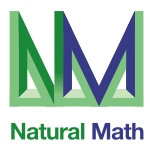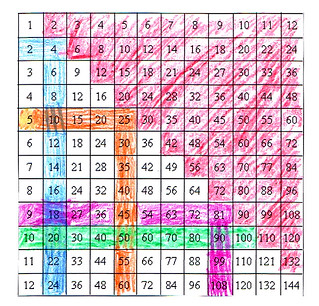Multiplication heat map, reworking calculus, join our crew: Newsletter February 5, 2015
Subscribe and read archives
Pinterest | Twitter | YouTube | Facebook | Google+

In this newsletter:
- “Heat map” of the hardest multiplication facts.
- Reworking calculus for 5 year olds: January survey.
- What is James really trying to do? James Tanton’s Common Core video and our reply.
- Math storytelling and crafts for an autistic spectrum child.
- We are hiring and seeking volunteers.
“Heat map” of the hardest multiplication facts
How do you know you are actually learning something? Usually, through testing. But how do you or your children feel facing a math test someone else inflicts? Many people find that scary and stressful. Yet total freedom from progress-tracking may sap motivation and make it hard to pursue big goals.
Computer games have levels and achievements that not only orient players within the game, but also add spice and motivation. Scientists also work on tracking progress in meaningful ways. Why not adopt these gamer or scientist techniques, in ways that make sense for you?

For example, check out this heat map for a group of children memorizing times tables. Think of your own maps you and your child can build. Which multiplication facts take you the longest to recall or figure out? Is your map symmetric, or do you also find 7*6 slightly easier than 6*7? And what does your map say about ways you can improve your number sense and fluency?
Our online course Multiplication Explorers helps participants learn these mapping tools. Here is an example: a work-in-progress map a teen created for reviewing times tables through patterns, a.k.a. “facts I don’t need to memorize.”

The next session of the course starts February 9th. Join with your family, math circle, or class!
199 families and groups signed up for the course as of this writing. We love to read notes from participants explaining why they join, so here are a few:
- I hope to solidify my 5th grader’s multiplication skills and introduce it to my first grader and maybe even four-year-old.
- Always looking for engaging ways to help my son (with poor working memory) to learn about multiplication – preferable without the reliance on rote learning!
- I will use the course and poster to help my special needs granddaughter in her struggles with math. She is a third grader.
- I teach at the secondary level to kids (Gr. 9 and 10) with very poor numeracy skills. I want to teach numeracy (esp. multiplication) since this has been a major ‘gap’ or roadblock to understanding curriculum.
- My homeschooler (age 7) is discovering multiplication. He thinks math is like a fun mystery puzzle.
Reworking calculus for 5 year olds: January survey
One of our ongoing projects is making calculus radically accessible. As in “a five-year old can do it” accessible. That’s why we started an informal survey. Maria Droujkova recently presented at the Joint Math Meetings, the largest math gathering in the world. She used this opportunity to ask the conference participants these questions:
- If you were to explain calculus to a non-mathematician friend through one idea, what would it be?
- How about that friend’s curious five-year-old kid?
- What is one calculus idea you’d want everyone in the world to understand?
We also took the survey to our blog and to Twitter. Here are some responses. Wouldn’t it be great if children learned that from calculus?
- The purpose of all math is to describe relationships in nature (@jevanyn)
- How calculus is used to determine and predict change in anything/everything (@earlsamuelson)
- That many functions are approximately linear at small scale. The idea of local vs global (@daveinstpaul)
- The concept of adding “more and more of less and less” (@dmarain)
You can view more responses and share your ideas on our blog.
What is James really trying to do?
James Tanton is one of our favorite mathematics educators. He recently created a neat learning manifesto full of ideas you can use to share meaning, relevance, and joy of mathematics – with the unexpected title of, “What is the Common Core and what is it really trying to do?” On her video blog Math Accent, Maria Droujkova responds with, “What is James really trying to do?”
What do you think?
Math storytelling and crafts for an autistic spectrum child
The richly illustrated story Lisa McCarville shared in January is one of the most-read on our blog. Lisa’s family deals with their special needs with care and creativity. Check out detailed instructions on DIY math manipulatives, and see why storytelling makes the world of difference.

Lisa writes: “The most important reason why I do what I do is these looks of happiness from my son. He loves learning this way. He uses what he learns in his own studies of art, drawing spaceships and futuristic communities using these shapes and patterns. He can synthesize what he learns and make it meaningful to his own interests. My goal is for him to be a lifelong learner and I think that making math enjoyable, practical and engaging leads to that goal.”
Want to share a math story, a short observation, or just a cute phrase your child said? Send it our way!
Join the Natural Math crew
We are growing. Can you help? Join our adventures!
Part-time paid positions
- Book layout. Help produce beautiful books for standard printing requirements (e.g. Ingram) as well as .ePub and .moby electronic formats.
- Community-centered marketing and sales. Focusing on helping people, sustainable growth, and meaningful engagement.
- Leading math circles and courses. Help us meet the demand for family activities in Raleigh-Durham, NC area, and/or lead online courses for families and teachers.
Volunteer opportunities
Spend quality time with engaged people working on meaningful mathematics! You can volunteer as little as an hour per month. Our current volunteers include teens, parents, university researchers, software developers, retired professionals, social media activists, and creative writers. This is perfect for people who want more active but still casual engagement, or want to ramp up their skillset and resume.
Email maria@naturalmath.com to talk about work or volunteering.
See you online! Dr. Maria Droujkova, Yelena McManaman, and the Natural Math crew
Related Posts
Posted in Newsletter












Leave a Reply